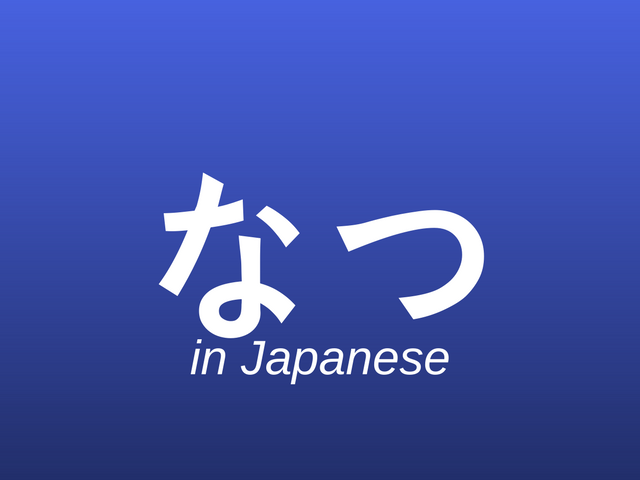One of the most popular anime/manga goes by the name of Fairy Tail. The main character’s name in the story is Natsu (spelled in Katakana as ナツ). But since Japanese is packed full of homophones, it comes as no surprise that this same word has several other meanings. So what does Natsu mean in Japanese?
Let’s go over the most common noun for the Japanese word なつ, the most common adjective that shares the same pronunciaiton, and also a couple of verbs as well. As a bonus, I’ll throw in a list of related vocabulary for the noun section.
Since I don’t typically advise that you learn a word in isolation, I’ll include a few example sentences for each seciton so that you can learn how to use each version of the word in a conversation, which is probably where you will encounter them.
There’s not much Rōmaji in this post for pronunciation, so make sure that you know how to read at least the basics of both kana scripts. I’ve also inserted audio to help with the phrases. Let’s begin!
Natsu – The Noun
The word Natsu, when used as a noun means “summer” in Japanese. It uses the kanji 夏 and is the second season of the year, right after spring finishes.
Some common compound words that use 夏 are:
夏休み / なつやすみ / summer vacation; summer holiday
夏場 / なつば / summertime
夏バテ / なつバテ / summer fatigue (due to the heat)
夏時間 / なつじかん / daylight saving time
夏場所 / なつばしょ / summer (May) tournament, held in Tokyo
夏季 / かき / summer season (notice the change in 夏‘s reading)
And there are still more words that use 夏 as a part of them, where the kanji 夏 brings the meaning of “summer” to the whole word, but since they are a lot less common than these ones that are listed here, I left them out for now.
If you are interested in seeing what they are, I would recommend you try looking them up in a Jisho.
- 明日から夏休みだなぁ!
Summer break starts tomorrow!
What I find interesting is that the 漫画家 (manga artist) who created Fairy Tail and its protagonist Natsu, made a different manga previously, that was also pretty sucessful called Rave Master.
The main dude in Rave Master was called ハル (haru) which is also the word for spring (春) in Japanese.
Will the 漫画家‘s next story have someone named Aki (秋) for autumn? Only time will tell!
And just in case you were wondering, the 漫画家‘s name is 真島 ヒロ (Hiro Mashima).
Natsu – The Adjective and the Verbs
The Japanese verb that uses the sound なつ is 懐かしい and it can mean “dear; desired; missed” but it is also used in the same way that we use the word “nostalgic” in English.
- 懐かしい故郷だ。懐かしいな!
This is my dear old home. How nostalgic!
There is also a verb that uses this same kanji and has a similar meaning to 懐かしい. Is it 懐く and it means “to become emotionally attached.”
Even though the word 懐く uses the kanji 懐 for the 「なつ」 part of it, I believe that it is more common to see the word written entirely in hiragana as なつく.
- この犬はこの猫よりも私たちになつく。
This dog is more attached to us than this cat.
You would run into 懐く / なつく if you were taking the JLPT-N1 test (the highest level), so it’s usually something that non-native students learn a lot later on in their studies.
It’s more likely that you will see or hear the word 懐かしむ which is also a verb that uses the 懐 kanji. The meaning of 懐かしむ is “to yearn for (someone, something); to miss” which is related to 懐く, but somewhat different.
- この歌を聞いたら、あなたについて思って、懐かしむんだ。
When I hear this song, I think of you, and miss you..
What I think is pretty cool about these last few words for なつ is the radical on the left side of the kanji 懐.
It changes a little when it goes from its own kanji, to being a part of another kanji, but the full version of it is 心 which means “heart” in the sense of a person’s “mind; heart; spirit” which I think makes a lot of sense with these two verbs and the adjective.
But what do you think?
Do you know any other words for なつ? Have you come across any examples in manga or anime that you could share?
Leave a comment and let me know!
Further Resources for Learning Japanese:
#3 Get My eBook (Secrets to Learning Japanese) for Free

またね!
